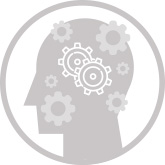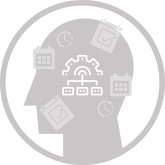Tech Matters

Tech Matters - You, me and technology
The world is waking up. The winter Paralympic games gave us all an awe-inspiring display of passion, talent, power and belief combined with technology. It also showcased the wonderful connections we can have with one another. The guided downhill skiing was simply incredible. Reaching speeds upwards of 60mph, Menna Fitzpatrick and Millie Knight, both 19, along with their sighted guides, Jen Kehoe and Brett Wild, brought back seven medals between them. Arms around their partners, a billowing flag draped over their shoulders with blue skies and white slopes drenched in sunlight as the backdrop to their glory. Images like that were the epitome of togetherness; where one cannot achieve without the other. Although the thought of skiing down a hill at 60mph with only 5% vision is scary, make no mistake, the guides would be as nervous as their partners. Both will extoll the virtues of the other after a successful descent - humble human kindness at its finest.
 The winter Paralympics, as with the summer games, gives us an idea of how the world is waking up to the reality that we are all different. More importantly, it is waking up to the fact that it is actually ok that we are all different. Working together shows we can all benefit from each other’s strength and that there is absolutely no need to dwell on a disability. Ramps for wheelchairs, disabled parking bays, cinemas with showings for the visually impaired, rules that ensure someone with a disability can still have a fair chance at the job they dream of doing - these are all important steps. And why shouldn’t the world wake up! There is a plethora of wonderful people on this planet; an untapped source of brilliance, steel, intelligence and strength of mind to create great things. The world certainly needs great people.
The winter Paralympics, as with the summer games, gives us an idea of how the world is waking up to the reality that we are all different. More importantly, it is waking up to the fact that it is actually ok that we are all different. Working together shows we can all benefit from each other’s strength and that there is absolutely no need to dwell on a disability. Ramps for wheelchairs, disabled parking bays, cinemas with showings for the visually impaired, rules that ensure someone with a disability can still have a fair chance at the job they dream of doing - these are all important steps. And why shouldn’t the world wake up! There is a plethora of wonderful people on this planet; an untapped source of brilliance, steel, intelligence and strength of mind to create great things. The world certainly needs great people.
And yet there is still so much more to do. Every day you hear stories of prejudice, discrimination, of a lack of care towards people perceived to be different or even simply a lack of patience towards them. Sadly, you can still so easily find a shop or restaurant that is inaccessible for a disabled person.
Of course, one of the biggest problems we have is when a home becomes inaccessible. For some, a life changing brain injury can not only leave them relying on public services to be kind, thoughtful and prepared in order to go about their daily lives but all of a sudden, they cannot even navigate safely around their own home. That’s where the wonderful Occupational Therapists come in to play. Part of their incredibly complex job (and passion) is to team up with their client so they can open the world up to them - even if it’s only their front room to begin with. Often after a traumatic lifetime event the front room can be someone’s entire world. An Occupational Therapist cannot change that obnoxious person who wouldn’t hold a door for the lady with the stick or the driver who overtakes the mobility vehicle and leaves no room to spare. They cannot make people speak normally to those with disabilities as their equals. They cannot magic up ramps where there are none or stop an employer having unfounded prejudices. They can work towards all these things of course but there is no magic wand. What is needed is that display of togetherness that was shown in the Paralympics - together, all as equals.
It is apparent that the world IS waking up but as yet it hasn’t woken up completely.
What has all this got to do with technology? Well, The Paralympic skiers used Bluetooth technology in their headsets to communicate with each other when hurtling down the slopes. The technology is impressive; it allows direct communication between two headsets in clear audio. The technological world has been working on many products which can help people improve their way of life, not just elite sportsmen and women but everyday folk like you and me. This got me thinking about how the technologies available today could help those who are unable to type, hear or see. Day-to-day tasks made simpler by technology, for example just having the ability to ask Alexa or Siri “What is on my schedule for Thursday” or “Please turn the kitchen lights on” – This sort of technology could be invaluable if you have a disability.
The late, great Stephen Hawkins is a perfect example of extreme technology partnering with a human guide. Back in 1985, Stephen lost the ability to speak after contracting pneumonia. His wife refused to allow the doctors to switch off the life support machines so they did what they could to keep him alive. Thankfully, he pulled through but one of the procedures – an incision in his neck to perform a tracheostomy - left him without the ability to speak. For some time, he required another person to hold up a letter card, they would point at the letters and then by raising his eyebrows he would acknowledge the correct letter to form words. I imagine this would have been a painstakingly slow but necessary process. Thankfully, society didn’t leave him behind or we could have lost one of the greatest minds of our generation. Over time, his initial ability to use his thumbs reduced due to the degenerative illness he was suffering from (known as, amyotrophic lateral sclerosis). As his body declined, the technology he used evolved. From a simple letter card to a computer designed by Intel that could register just a twitch from a single muscle in his cheek. But they didn’t stop there - even attempting to read brainwaves and form letters that way with varying degrees of success. There are many fascinating articles online which I urge you to read that go into greater detail. Without Intel’s technology and, of course, many amazing doctors,nurses and Occupational Therapists, we wouldn’t have “A Brief History of Time”, one of the most iconic books ever to be written and a true inspiration to anyone who has a disability. This alone is perfect proof that we, as humans, can achieve amazing things no matter the hurdles faced. He inspired many and not because people looked at his disability but they looked beyond that and used technology to access his ability. (Check out our Hidden Disability, Hidden Ability Blog here)
 Stephen’s partner or guide in this case was his computer, he embraced it and it helped him achieve great things, we as a society benefitted hugely from these things because we saw beyond his disability as did he.
Stephen’s partner or guide in this case was his computer, he embraced it and it helped him achieve great things, we as a society benefitted hugely from these things because we saw beyond his disability as did he.
This is the ethos behind the Krysalis “Tech Matters” blog. It will aim to be a guide and an inspiration for you to get involved with technology and recognise how it can help not only your life, but that of a client, family member or friend.
First up will be the SMART home devices: Amazon’s Alexa Echo; Google’s Home and Apple’s Home pod. We will aim to teach you which is best and which is most helpful. We will provide tips on how to set them up so please do look out for the upcoming blog.
In addition, we will also be covering Windows accessibility options, SMART watches and in-car devices but, more specifically, how these devices can help anyone with a disability. If you use a piece of technology that could help others we would love to hear about it. We could feature it right here. Get in touch and let us know.
I hope you enjoy the ride and, more importantly, find the information helpful. I will be providing a new instalment each month, and whilst I can’t promise each one will be an exhilarating downhill ride at 60mph, for me, it would be more fun with you around. I’ll be the guide – you can all follow ten meters behind, being brilliant with your new pieces of technology in tow and together we can help the world wake up even more!

